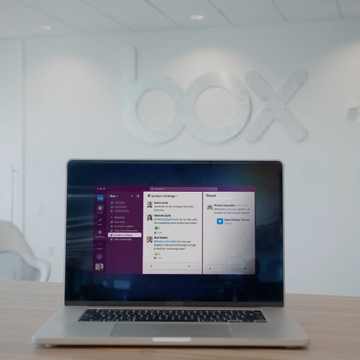Kakuichi was founded in 1886, dealing in agricultural tools, among other items. Today, they have their hands in a number of enterprises, from agricultural manufacturing equipment such as sturdy steel garages and hoses to environmental projects such as solar power and advanced aquatic solutions.
Mr. Riu Tanaka, the company’s chief executive, calls his firm a “historical venture company.” What powers this more than 130-year-old organization is its venture mindset. It sifts through the world’s needs to find business opportunities, proactively taking on new fields. This is precisely the spirit that has safely navigated it from the Meiji Era in the late 1800s to today’s Reiwa Era.


Yet, legacy institutions are often stuck in old ways of doing business. The paper invoice, the fax machine, and the phone call rule in customer dealings. Until only a few years ago, salespeople had no PCs, and there was even no Wi-Fi to be found. This tech latency showed in the company’s internal communication; at the time, employees didn’t even think to share information with each other.
What CEO Tanaka wanted was “an organization that could think on its own, and act with agility.” He felt a sense of urgency, seeing that “organizations where employees act based on orders from above don’t work in this day and age.” In order to resolve this, he thought it was critical to start by changing the way they communicated.
It was then that Kakuichi began their journey with Slack, at the leadership of the chief executive. Slack didn’t only change their communication, but revolutionized the organization itself.

“Our challenge is how a company this old and established can change. But if this old company can create innovation and chase its dream, I think I'd like that very much.”
As organization-wide info-sharing accelerates, so does decision-making
Before, Kakuichi’s communication was done purely on a one-to-one basis, either via email, phone, fax, or face-to-face. The broader company wasn’t a part of these conversations. Even when Mr. Tanaka spoke to his employees, it often became him speaking and them listening.
This lack of information-sharing impacted their decision-making as well. Without information, people came to the decision “not to make a decision”, and their speed suffered as a result.
Bringing in Slack enabled a complete makeover. Firstly, their “one-on-one” communication became “one-to-all.” Slack allows for logged communications in channels, so anyone can see the conversation and jump in anytime, from anywhere. By integrating Unipos with Slack, an application for peer-to-peer bonuses, employees can send points to their colleagues along with their appreciation, visible to all.
According to Mr. Tanaka, “we can see the conversations, comment on them, and react to them. I think we’ve come to a place where we can talk to each other even when we’re far apart.” His long-held dream of a family conversation-like network of communication was finally given life with Slack.
Beyond that, opening up access to information to more than just small circles of employees helped them share more and more helpful information with field colleagues working all across Japan. Mr. Tanaka sees value in the changes in his team’s mindsets. “With Slack, our employees have gone from just passively taking in data to proactively sharing interesting and helpful information.” Also, with easier information-gathering from field sites, decision-making accelerated to a stunning four times the speed.
Mr. Tanaka also created a new Slack channel, #info-ceo-tweets. Originally, it was just a channel for him to post messages to the company, but he began to make posts that carried more significant updates, with around 70% of employees replying or giving feedback to these. Mr. Tanaka also makes use of Slack’s “Reacji Channeler” function with his custom “President” emoji. When he finds a post he wants his employees to take special notice of, he reacts to it with this emoji, automatically sending it to a specific channel. According to Mr. Tanaka, by making Kakuichi’s formerly one-way communication a multidirectional process, “I realized that Slack is an extremely powerful tool.”
“We've only had Slack for a year, but it's been incredible how this information tool has transformed our organization and changed our mindsets.”
Connecting dispersed sales teams to provide faster response time to customers
Ms. Kaede Yanase, a member of the Corporate Planning Division’s IT Group, was part of the project team the president created for Slack’s implementation. She had only been at Kakuichi for half a year when she was tasked with driving the rollout. She recalls how the company was at the time. “We didn’t even have a Wi-Fi environment in place. There were phone calls and faxes going back and forth. I remember clearly thinking, what year is this?”
Originally, only a few employees were familiar with computers and social media. Though that situation presented an obviously daunting task to start, Ms. Yanase compared and tried out a number of tools, realizing that “Slack is easy to use on whatever device you have.”
The implementation began with five sales offices, where there were relatively IT-literate employees. Each location nominated two IT Ambassadors, taking Slack’s Katakana renditions of English terms and translating each into Japanese to put in a user manual. They then used Zoom to run through lectures on how best to use Slack. They also restricted creation of private channels, promoting communication in public ones for greater transparency and knowledge-sharing.
As employees working in Kakuichi’s locations across Japan began to communicate openly over Slack, they saw a dramatic increase in the speed of resolving their customers’ problems. For example, one post by an employee asking how they could fix a certain issue happening for a customer received replies from sales personnel across 100 different locations, all working in the same business field. The query almost immediately gathered a wealth of knowledge; responders offered their own experience and advice for what they should do in the situation.
Ms. Yanase saw first-hand how effective Slack was. “Not only did the speed of our information-sharing increase, but we were able to create an environment where we could take a look at what was actually going on at each location, what employees were struggling with, and what kind of ideas were popping up. People were copying good ideas, and those would spread across the company. That’s something that couldn’t have happened at our company until now.”
Kakuichi’s attitude has always been that “when it’s time to do it, we go all-out.” It’s a simple concept. “Just give it a try. The unwieldy stuff will wash out, and the real thing will always be left standing.” That means Slack must be “the real thing.”
“Not only did the speed of our information-sharing increase, but we were able to create an environment where we could take a look at what was actually going on at each location, what employees were struggling with, and what kind of ideas were popping up.”

Implementing Slack revolutionizes company culture and organizational structure
According to Mr. Tanaka, “The culture of employees considering and communicating information of mutual benefit and showing appreciation for good information spread across the entire company only a year after Slack was implemented. Today, Kakuichi’s weekly average user (WAU) ratio for Slack is 94%.
Because all of our employees (not only senior management) now possess information, we have created an organization that has no need for middle management.” That said, with the dissolution of a traditional organization, authority and responsibility tend to become murky. At Kakuichi, they have created a mission-type task force to prevent this and a system for evaluations. Further, by making these open to all, employees can see the company’s transformation themselves.
Now, having experienced this Slack-driven transformation, Kakuichi has begun leveraging Slack for their agricultural improvement enterprise. One of their ongoing trials is to create a community of farmers who are using their equipment so that they can get feedback and share best practices. They’re using Slack channels to exchange information amongst themselves. With his stated mission of “connecting farmers together with Slack just like we did in revitalizing and transforming our company,” Mr. Tanaka believes that sharing both good and bad information over Slack is the greatest benefit for farmers.
Further, Mr. Tanaka says there’s also potential for changing Japanese society as it is today. “In Japan, risk aversion is pre-eminent. In other words, ‘the default is to say no.’ But a world with more ‘let’s give it a try’ would be better. You need to have information to do that. If we can share our experiences and give each other feedback, we can make an organization better and better. With Slack, I think we could make a better society.














